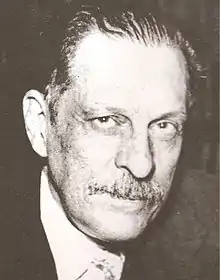Manuel Márquez Sterling
Manuel Márquez Sterling (born Carlos Manuel Agustin Márquez Sterling y Loret de Mola on August 28, 1872 in Lima, Peru – December 9, 1934, Washington, DC, United States) was a Cuban diplomat and interim President of Cuba for 6 hours on January 18, 1934.[1] In an article published by Bohemia in December, 1934 (as a result of his death) he is credited with saving the life of Mexican President Francisco I. Madero, when the latter was hiding from the authorities of then Mexican President Porfirio Diaz, during the initial states of the Mexican Revolution.
Manuel Márquez Sterling | |
|---|---|
 | |
| President of Cuba Interim | |
| In office 18 January 1934 (6 hours) | |
| Vice President | None |
| Preceded by | Carlos Hevia (Interim) |
| Succeeded by | Carlos Mendieta (Interim) |
| Personal details | |
| Born | August 28, 1872 Lima, Peru |
| Died | December 9, 1934 (aged 62) Washington, D.C., United States |
| Nationality | |
| Spouse | Mercedes Márquez Sterling y Ziburo |
He served in the Cuban War of Liberation and went to Washington in 1901 as member of the Cuban mission to protest the Platt Amendment. After a journalistic career he served in diplomatic service for many years. He resigned as Ambassador to Mexico in 1932 after differences with Machado. He later became ambassador to the United States under the presidency of Carlos Manuel de Cespedes y Quesada, acted as Cuban representative under Grau's presidency and also acted as Cuban ambassador under Mendieta's presidency.
He was married to his cousin, Mercedes Márquez Sterling y Ziburo. He was the uncle of Carlos Márquez Sterling, a figure in Cuban politics.
He tied for 16-17th in the Paris 1900 chess tournament (Emanuel Lasker won) played during the world exhibition.
References
- Fulgencio Batista: Volume 1, From Revolutionary to Strongman, Argote-Freyre, Frank (Rutgers, New Jersey: Rutgers University Press, 2006) ISBN 0-8135-3701-0
- https://web.archive.org/web/20080123115616/http://www.vitral.org/vitral/vitral51/cent.htm
- https://web.archive.org/web/20080619170844/http://www.endgame.nl/wfairs.htm
- Otero, Juan Joaquin (1954). Libro De Cuba, Una Enciclopedia Ilustrada Que Abarca Las Artes, Las Letras, Las Ciencias, La Economia, La Politica, La Historia, La Docencia, Y ElProgreso General De La Nacion Cubana - Edicion Conmemorative del Cincuentenario de la Republica de Cuba, 1902-1952. (Spanish)
